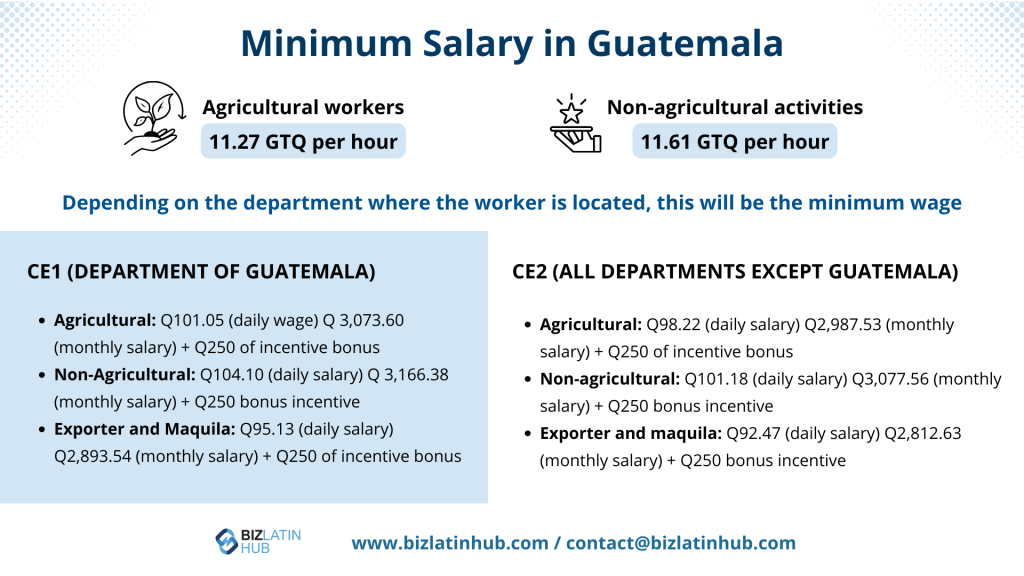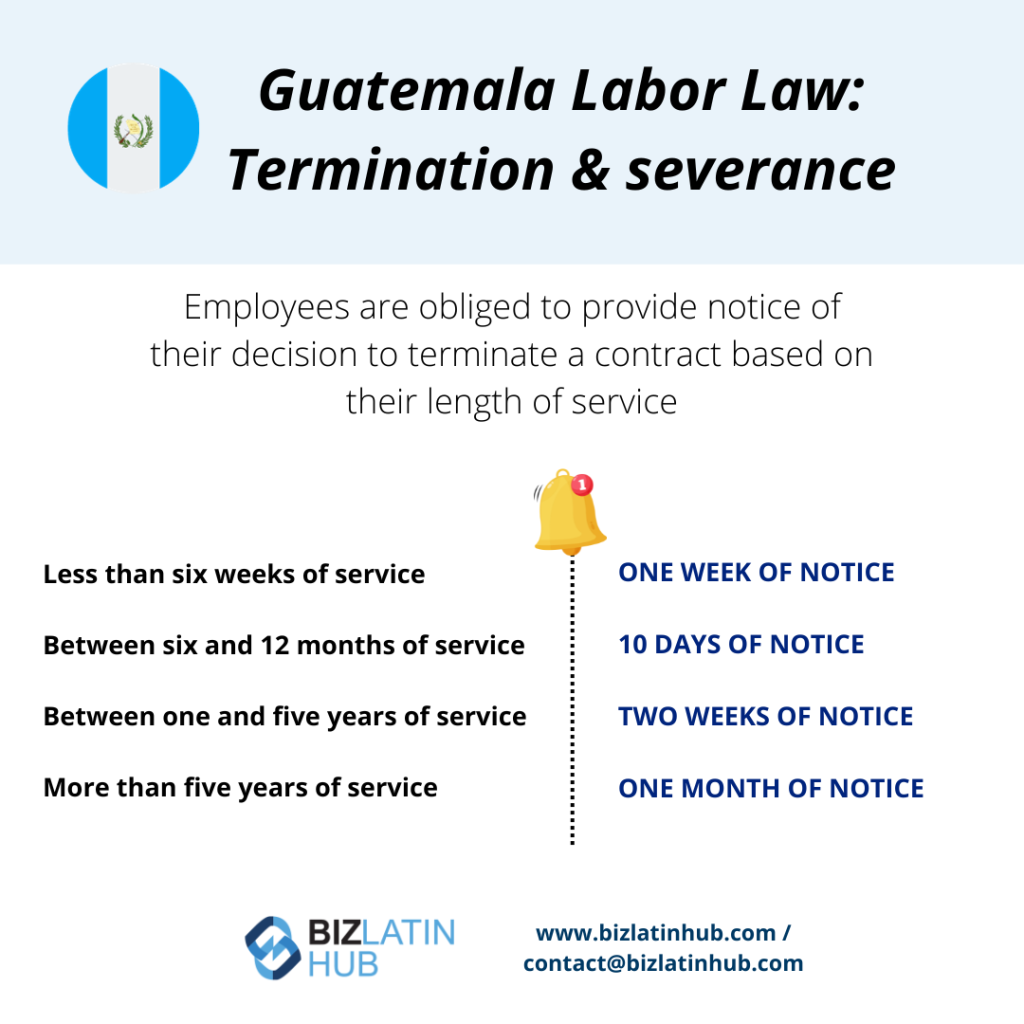If you are interested in starting a business in Guatemala, or are already active in Central America’s largest economy, adherence to employment law in Guatemala will be essential to the smooth running of your company and the maintenance of your good standing with local authorities.
Employment law in Guatemala is overseen by the Ministry of Labor and Social Welfare, and although employment regulations share many similarities with those found in other jurisdictions, there are also considerable particularities to take into account. That’s where a reliable local partner such as Biz Latin Hub can step in to help out.
Below, an overview of employment law in Guatemala is provided, covering standard working hours, common contract types, terminations, and severance, leave and other absences, and the salary-based contributions that employers must oversee.

What are the working hours based on the employment law in Guatemala?
Statutory working hours under employment law in Guatemala differ based on whether an employee is a daytime, nighttime, or mixed-shift worker.
For daytime workers, who are defined as those whose regular working hours fall between 06:00 and 18:00 on a given day, the working week is a maximum of 44 hours long, based on eight-hour working days, meaning that a standard working week consists of five and a half working days.
For nighttime workers, who are defined as those whose regular working hours fall between 18:00 and 06:00 the next day, the working week is a maximum of 36 hours long, based on 6-hour working days, meaning that a standard working week consists of five working days.
Mixed-shift workers have a regular schedule that involves both daytime and nighttime working hours as earlier defined. Usually, a given shift should include no more than three hours of nighttime hours and should be a maximum of seven hours long. A mixed-shift worker should work no more than 42 hours per week, meaning that a standard working week consists of a maximum of six working days.
Note that, there are generally between eight and ten public holidays that fall on weekdays each year, as well as an additional public holiday observed in capital Guatemala City which can fall on a weekday.
What contracts do Guatemalan employees have?
There are three types of individual labor contracts used under employment law in Guatemala, consisting of:
- Indefinite-term contracts Indefinite-term contracts are the most widely used type of contract in Guatemala. They have no set termination date and end only through mutual agreement between the employer and employee or when one party can act unilaterally. Such instances include an employee resigning from their role, or an employer terminating the contract due to the employee’s malpractice, following the legal procedure for dismissal.
- Fixed-term contracts run for a set period specified within the contract itself.
- Specific work contracts are used for the completion of a particular task or project, for which parameters and benchmarks, including what the conclusion of the task entails, must be clearly stated within the contract.
How does employment law in Guatemala cover termination?
Under employment law in Guatemala, employees are obliged to provide notice of their decision to terminate a contract based on their length of service with the employer, set out as follows:

- Less than six weeks of service = one week of notice.
- Between six and 12 months of service = 10 days of notice.
- Between one and five years of service = two weeks of notice.
- More than five years of service = one month of notice.
If the employer wishes to unilaterally terminate an employee’s contract without just cause, the employee will be entitled to:
- Any payment owed for the days worked.
- Compensation for unused vacation and public holiday allowance.
- A proportion of the two annual bonuses (the thirteenth and fourteenth salary) is based on the proportion of the time they have worked.
- A severance payment equal to one month of salary for each year of service.
An employee can only have their contract terminated without the right to compensation when they are found guilty of misconduct, as laid out in Article 77 of the Guatemalan Labor Code.
What vacations, leaves and other absences are there under Guatemalan law?
Employment law in Guatemala establishes that employees who have served at least one year with the same employer are entitled to a vacation period that must last at least 15 working days.
- Maternity and paternity leave: Guatemalan employment law dictates that expectant mothers are entitled to a maximum of twelve weeks (84 consecutive days) of maternity leave. That is generally made up of 30 days before the due date and 54 days after the birth. New fathers are entitled to a total of two days of paternity leave.
- Sick leave: Any employer registered with the National Social Security Program (IGSS) must provide sick leave permission to employees and will be liable for a portion of their payment, based on factors including:
- type of sickness.
- length of service with the company.
- Internal Social Security regulations.
If the employer is not registered with the IGSS is obliged to provide sick leave permission to the employee until they make a full recovery, as well as a portion of their salary during the first three months of their leave, with that portion based on their length of service.
Note that an employer is obliged to register with the IGSS if the company employs three or more permanent employees.
- Bereavement: In the event of the death of an employee’s spouse or common-law partner, parent, or child, they are entitled to three days of bereavement leave.
- Marriage: An employee is granted five days of leave when they get married.
- Court summons: Any employee summoned to court is entitled to paid leave for the duration of the period that they must attend the court.
- Union duties: Any employee who is a member of the executive committee of a union is entitled to up to six days of leave per calendar month in order to carry out their duties.
What contributions are necessary under Guatemalan law?
- Employee deductions: A total of 4.83% of an employee’s salary is deducted by the employer and provided to the IGSS.
- Employer contributions: Employers must make contributions totalling 12.67% of the value of a given employee’s salary. Those contributions go to the IGSS, the Institute of Recreation of Workers of the Private Company of Guatemala (IRTRA), and the Guatemalan Technical Training Institute (Intecap), with each contribution equivalent totaling:
- IGSS: 10.67% of the employee’s salary
- IRTRA: 1% of the employee’s salary
- INTECAP: 1% of the employee’s salary
FAQs about employment law in Guatemala
In our experience, these are the common questions and doubtful points of our Clients.

Labor laws in Guatemala include a standard working week of 44 hours, with 8 hours per day. Overtime is allowed for up to 10 hours, with overtime pay at 1.5 times the normal hourly wage. Maternity leave is provided for 12 weeks, and employees are entitled to 15 working days of annual vacation leave. There must be a minimum rest period of 12 hours between each working day, and employees are entitled to one day of paid rest after each working week. Notice periods for terminating a contract vary based on length of service. Additionally, employees are entitled to receive both a 13th and 14th-month bonus, known as “aguinaldo“.
The working conditions in Guatemala include a maximum of 8 hours per day and a total of 44 hours per week. Daytime work is defined as the period between 6 and 18 hours on the same day.
The standard working day in Guatemala consists of 8 hours.
Department of Guatemala
Agricultural: Q107.11 (daily wage) Q3,266.86 (Monthly salary) + Q250 of incentive bonus.
Non-Agricultural: Q110.97 (daily wage) Q3,384.59 (Monthly salary) + Q250 of incentive bonus.
Exporter and Maquila: Q101.41 (Daily wage) Q3,093.01 (Monthly salary) + Q250 of incentive bonus.
Other departments of Guatemala:
Agricultural: Q102.44(daily wage) Q3,124.42 (Monthly salary) + Q250 of incentive bonus.
Non-Agricultural: Q105.85 (daily wage) Q3,227.82 (Monthly salary) + Q250 of incentive bonus.
Exporter and Maquila: Q95.80 (Daily wage) Q2,921.90 (Monthly salary) + Q250 of incentive bonus.
Overtime in Guatemala is paid as an additional payment of 50% of the employee’s contracted hourly rate of pay for any work carried out beyond the standard working time restrictions.
The laws regarding employment termination in Guatemala state that the notice period for termination varies based on the length of continuous service. If an employee has been working for less than six months, the notice period is at least one week.
The laws regarding employment termination in Guatemala state that the notice period for termination varies based on the requirements for terminating an employee in Guatemala are as follows:
Less than six weeks of service: one week of notice.
Between six and 12 months of service: 10 days of notice.
Between one and five years of service: two weeks of notice.
More than five years of service: one month of notice.
When an employee quits in Guatemala, they must receive their final wages in their last day of work. However, severance pay does not apply if the employee voluntarily terminates the employment contract. The employee’s settlement must include proportional payments of salary, 13th and 14th salary and vacations if he or she has not enjoyed them.
Biz Latin Hub can help with employment law in Guatemala
Biz Latin Hub is a professional services company providing integrated market entry and back office services throughout Latin America and the Caribbean.
As well as in Guatemala City, we have offices in 15 other jurisdictions in the region, meaning we are ideally placed to support multi-jurisdiction market entries and cross-border operations.
Our portfolio includes accounting & taxation, company formation, due diligence, legal services, and hiring & PEO, among others.
We are committed to compliance everywhere we operate, so working with us comes with the guarantee that your company will fully adhere to employment law in Guatemala or any other market where we assist you.
Contact us today to find out more about how we can support you doing business in Guatemala.
Or learn more about our team and expert authors.






